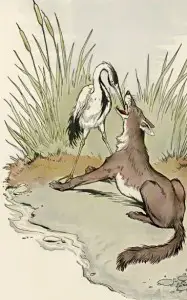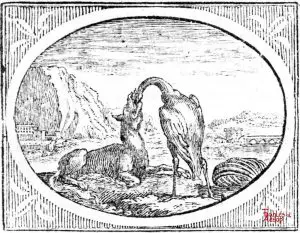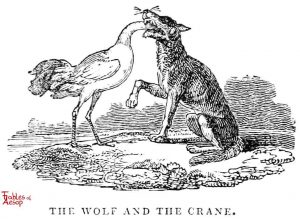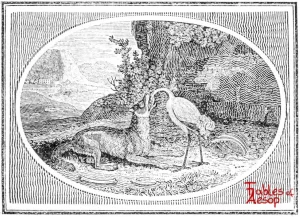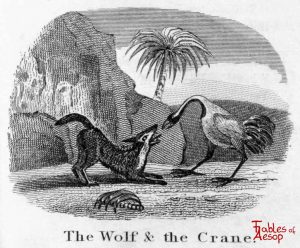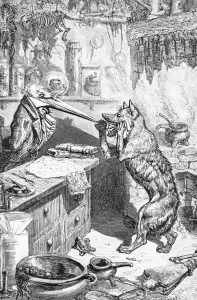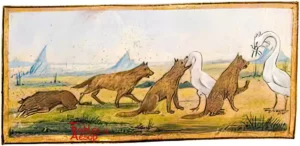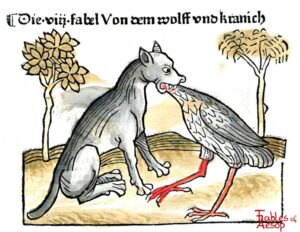A Crane wanted to get paid for taking a bone from the throat of a Wolf. The Wolf advised caution.
When working for a tyrant, feel lucky to escape alive.

Aesop For Children
A Wolf had been feasting too greedily, and a bone had stuck crosswise in his throat. He could get it neither up nor down, and of course he could not eat a thing. Naturally that was an awful state of affairs for a greedy Wolf.
So away he hurried to the Crane. He was sure that she, with her long neck and bill, would easily be able to reach the bone and pull it out.
“I will reward you very handsomely,” said the Wolf, “if you pull that bone out for me.”
The Crane, as you can imagine, was very uneasy about putting her head in a Wolf’s throat. But she was grasping in nature, so she did what the Wolf asked her to do.
When the Wolf felt that the bone was gone, he started to walk away.
“But what about my reward!” called the Crane anxiously.
“What!” snarled the Wolf, whirling around. “Haven’t you got it? Isn’t it enough that I let you take your head out of my mouth without snapping it off?”
Moral
Expect no reward for serving the wicked.

Samuel Croxall
A WOLF, after devouring his prey, happened to have a bone stick in his throat, which gave him so much pain, that he went howling up and down, and importuning every creature he met, to lend him a kind hand in order to his relief; nay, he promised a reasonable reward to any one that should undertake the operation with success. At last the Crane, tempted with the lucre of the reward, and having first procured him to confirm his promise with an oath, undertook the business, and ventured his long neck into the rapacious felon’s throat. In short, he plucked out the bone, and expected the promised gratuity. When the Wolf, turning his eyes disdainfully towards him, said, I did not think you had been so unconscionable; I had your head in my mouth, and could have bit it off whenever I pleased, but suffered you to take it away without any damage, and yet you are not contented!
THE APPLICATION
There is a sort of people in the world, to whom a man may be in the wrong for doing service, upon a double score; first, because they never deserved to have a good office done them; and secondly, because, when once engaged, it is so hard a matter to get well rid of their acquaintance.
This fable is not an example of ingratitude, as at first sight it seems to be, and as some of the mythologists have understood it; to make a parallel in that case, the Crane ought to have been under some difficulties in his turn, and the Wolf have refused to assist him when it was in his power. The whole stress of it lies in this, that we ought to consider what kind of people they are to whom we are desired to do good offices, before we do them; for he that grants a favour, or even confides in a person of no honour, instead of finding his account in it, comes off well if he is no sufferer.

Thomas Bewick (The Wolf and The Crane)
A Wolf, after devouring his prey, happened to have a bone stick in his throat, which gave him so much pain, that he went howling up and down, and importuning every creature he met to lend him a kind hand in order to his relief; nay, he promised a reasonable reward to any one who should perform the operation with success. At last, the Crane undertook the business, ventured his long neck into the rapacious felon’s throat, plucked out the bone, and asked for the promised reward. The Wolf, turning his eyes disdainfully towards him, said, I did not think you had been so unconscionable: I had your head in my mouth, and could have bit it off whenever I pleased, but suffered you to take it away without any damage, and yet you are not contented!
Who serves a villain, might as wisely free The hardened murderer from the fatal tree.
APPLICATION.
There are people in the world to whom it may be wrong to do services, upon a double score: first, because they never deserve to have a good office done them; and secondly, because when once engaged, it is so hard a matter to get well rid of their acquaintance. We ought to consider what kind of people they are, to whom we are desired to do good offices, before we do them: for he that grants a favour, or even confides in a person of no honour, instead of finding his account in it, comes off well, if he be no sufferer in the end.
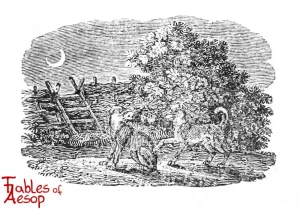

Eliot/Jacobs Version
A Wolf was eating an animal he had killed, when suddenly a small bone in the meat stuck in his throat and he could not swallow it. He soon felt terrible pain in his throat, and ran up and down seeking something to relieve the pain. He tried to induce everyone he met to remove the bone. “I would give anything,” said he, “if you would take it out.”
At last the Crane agreed to try, and told the Wolf to lie on his side and open his jaws as wide as he could. Then the Crane put its long neck down the Wolf’s throat, and with its beak loosened the bone and removed it.
“Will you kindly give me the reward you promised?” said the Crane.
The Wolf grinned, showed his teeth and said: “Be content. You have put your head inside a Wolf’s mouth and taken it out again in safety; that ought to be reward enough for you.”

Jefferys Taylor
A WOLF, once forgetting the size of his swallow,
Tried to pass a large marrow-bone through it.
Oh dear!” said the beast, thinking death was to follow,
“How careless and stupid to do it!”
His mouth was propp’d open by means of the bone,
And his breathing was greatly impeded;
But a crane coming up, he contrived to make known
What kind of assistance he needed.
“How d’ye do,” said the bird; said the beast, “Very ill,
For a bone has got down the wrong way;
But if you can extract it by means of your bill,
The service I’ll amply repay.”
Thought the crane, “I’m no surgeon; yet all must agree,
That my beak will make excellent forceps;
And as for the money, I do not now see
Why I need refuse taking his worship’s.”
Said the bird, “It’s agreed;” said his patient, “Proceed,
And take the bone hence, I beseech;”
Which, after a while, and with infinite toil,
The crane at last managed to reach.
“Thank my stars!” said the beast, from his terrors released,
—”Thank you too, sir,” said he to the bird:
“Alas!” said the crane, “is this all I’m to gain,
I was waiting the promised reward.”
Said the wolf, “You forget I’ve contracted no debt,
Since the service was render’d by me;
Your head I released from the jaws of a beast,
And now you’re demanding a fee!”
Give your help to a wolf, should he beg for your aid,
But you must not expect when you’ve done to be paid.

JBR Collection
A Wolf devoured his prey so ravenously that a bone stuck in his throat, giving him great pain. He ran howling up and down, and offered to reward handsomely any one who would pull it out. A Crane, moved by pity as well as by the prospect of the money, undertook the dangerous task. Having rcmoved the bone, he asked for the promised reward. “Reward!” cried the wolf: “pray, you greedy fellow, what reward can you possibly require? You have had your head in my mouth, and instead of biting it off, I have let you pull it out unharmed. Get away with you, and don’t come again within reach of my paw.”

Townsend version
A Wolf who had a bone stuck in his throat hired a Crane, for a large sum, to put her head into his mouth and draw out the bone. When the Crane had extracted the bone and demanded the promised payment, the Wolf, grinning and grinding his teeth, exclaimed: “Why, you have surely already had a sufficient recompense, in having been permitted to draw out your head in safety from the mouth and jaws of a wolf.”
Moral
In serving the wicked, expect no reward, and be thankful if you escape injury for your pains.

L’Estrange version
A wolf had got a bone in’s throat, and could think of no better instrument to ease him of it, than the bill of a crane; so he went and treated with a crane to help him out with it, upon condition of a very considerable reward for his pains. The crane did him the good office, and then claim’d his promise. Why how now, impudence! (says t’other) do you put your head into the mouth of a wolf, and then, when y’ave brought it out again safe and sound, do you talk of a reward? Why sirrah, you have your head again, and is not that a sufficient recommence?
Moral
One good turn, they say, requires another: but yet he that has to do with wild beasts (as some men are no better) and comes or with a whole skin, let him expect no other reward.

Crane Poetry Visual
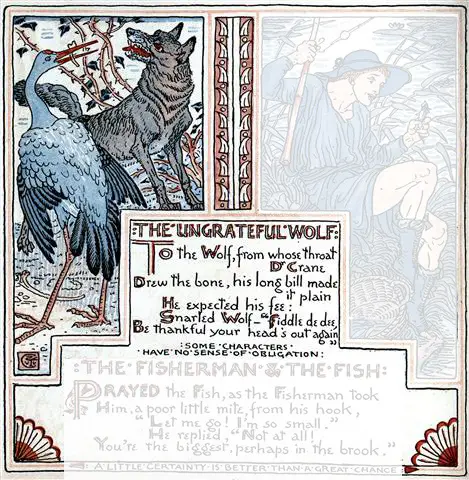
To the Wolf, from whose throat D’Crane
Drew the bone, his long bill made it plain
He expected his fee:
Sharled Wolf … “Fiddle de dee,
Be thankful your head’s out again.”
Some characters have no sense of obligation.

Gherardo Image from 1480

Heinrich Steinhöwel (Of the Wolf and the Crane)

Grus et Lupus
In faucibus lupi os inhaeserat. Mercede igitur conducit gruem, qui illud extrahat. Hoc grus longitudine colli facile effecit. Cum autem mercedem postularet, subridens lupus et dentibus infrendens, “Num tibi,” inquit, “parva merces videtur, quod caput incolume ex lupi faucibus extraxisti?”
Perry #156
